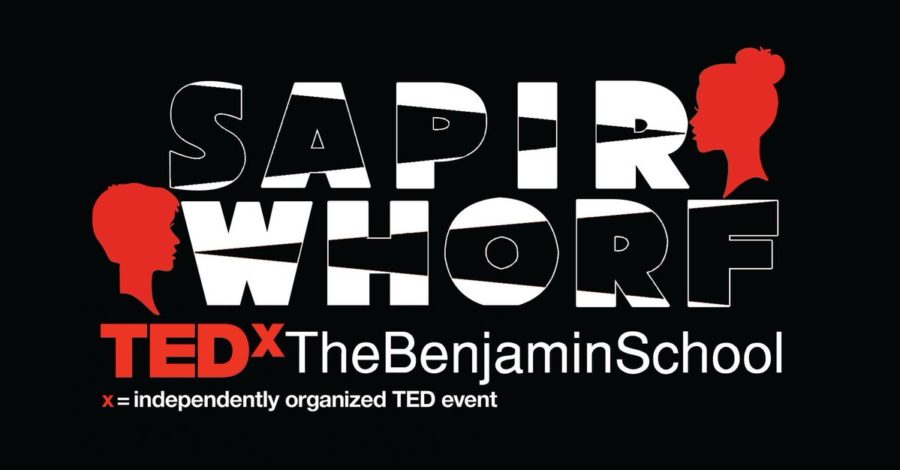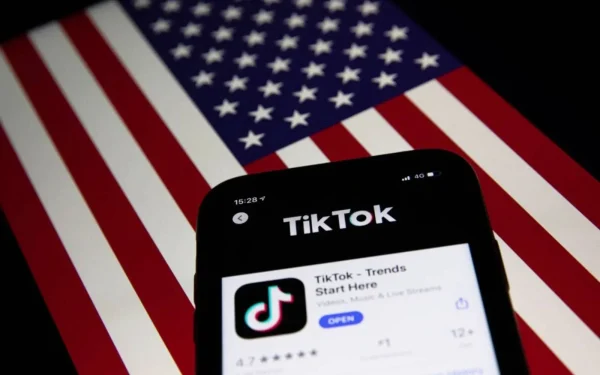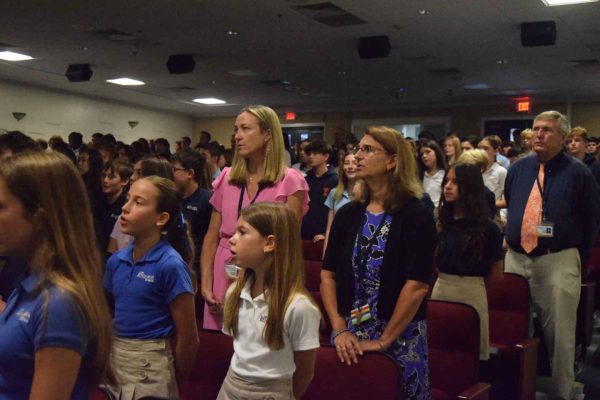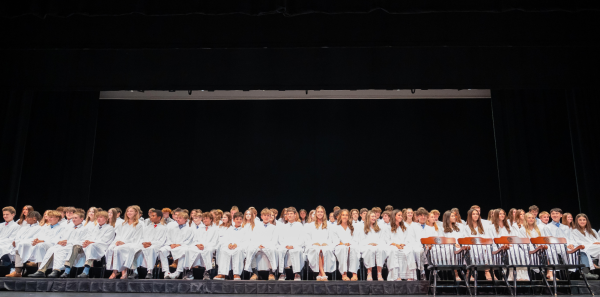This Year’s TEDx Event Promises to Be the Best One Yet
Logo courtesy of Corey Morrow.
This year’s TEDx event will be livestreamed from the Upper School on April 21.
Coming up on Saturday, April 21 will be the huge TEDxTheBenjaminSchool event, taking place for the first time on the beautiful stage in Benjamin Hall. Previously, the event has been held in The Barker Performing Arts Center on Benjamin’s Lower/Middle School Campus. This year, Dean of Students Dr. Cristina James, who annually organizes TEDxTheBenjaminSchool, has expanded the project and brought it to the larger, state-of-the-art facility at the Upper School.
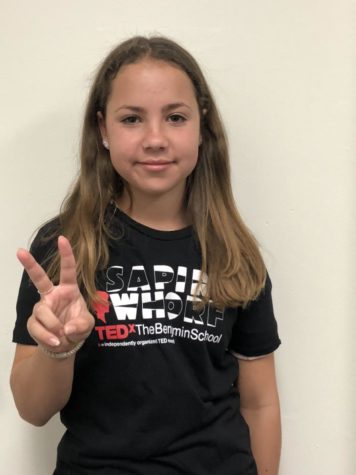
“I am very excited and privileged to have the opportunity to go into this grand and amazing [space which] has raised our aspirations, and it lets us think bigger about our talks and this event,” said James. “Gianna Ajmo says in her talk that context really matters, and this context [of Benjamin Hall] does matter.”
But what is a TEDx talk? According to ted.com, “TED is a nonprofit devoted to spreading ideas, usually in the form of short, powerful talks (18 minutes or less). TED began in 1984 as a conference where Technology, Entertainment and Design converged, and today covers almost all topics — from science to business to global issues — in more than 100 languages. Its talks are given by people and professionals from all walks of life in regard to these three areas. Those talks are then filmed and placed on the TED website (www.ted.com). In order for an individual to have a talk worthy of filming, it must be, as TED puts it, “an idea worth spreading.”
TEDx events, on the other hand, are independently organized TED events that can be spearheaded by anyone who is granted a free license from TED, and agrees to follow certain stipulations (i.e. creating unique marketing for the event by incorporating the TED brand, filming the event, etc.).
“Organizing a TEDx event is fairly simple because TED wants anyone who wants one to have an event,” said James. “[The process includes] applying on ted.com to have an event, and [TED] will get back to you in a [short] time period. Then each year I just renew the licence so that we can have another event.”
James first heard about TEDx while attending a conference at another school “A few years ago, I went to a conference at Pine Crest in Ft. Lauderdale, and Aaron Gillego – who teaches AP English Literature – already organized a TEDx event, and he explained to me how to organize one, and I got really excited and I started doing it here.” Each year, James has improved upon the event. Now in its third year, James is ready to hold the best TedxTheBenjaminSchool yet.
This year’s theme is “Sapir Whorf,” a phrase that refers to a theory developed by Edward Sapir and Benjamin Lee Whorf. It states that the structure of a language may determine or greatly influence the ideas and behavior characteristic of the culture in which it is spoken. It’s a theme that is the common thread through many of this year’s talks, the most of which will be given by students.
In all, 27 TBS student speakers were chosen: 24 seventh graders, two eighth graders, and one fourth grader. After the winter break, the seventh and eighth-grade English students and those eighth graders in the Communication Arts classes began to think about their “ideas worth spreading” for their own personal TEDx talks. The students not only crafted their talks for a grade, but so they might also have a chance of giving their talks from the Benjamin Hall stage on April 21.
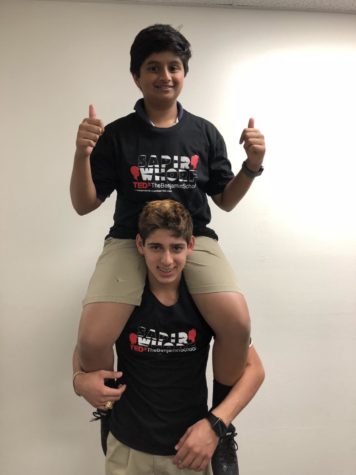
Eighth graders Sai Chigurupati (top) and Cameron Salehi will deliver their TEDx talk together.
Eighth graders Sai Chigurupati, and Cameron Salehi will deliver a TED talk together about Supreme, the New York-based apparel company. “I chose my TED talk because I got a green slip that day because of Supreme, and Cameron, my partner, was doing a talk about Hypebeasts, so we combined our talks and are now working towards the big day,” said Chigurupati. “Our talk is about how you can be influenced so easily by a product that everybody wants.” He and Salehi will be the first duo to give a talk at TEDxTheBenjaminSchool.
Some other talks are seventh grader Shep Gregory’s talk about how nothing is something. “I figured out that a philosopher, Parmenides, had made so many theories about nothing,” said Gregory. “I also learned about a composer named John Cage who made a [musical] piece called ‘John Cage’s 4’33.’ In this piece, he did nothing but wait and use a timer. He says this was to illustrate that silence was the music in between the notes.”
Other examples of talks include seventh graders Eden Doner who will discuss what goes into making leitmotifs (recurring themes throughout works of literature), Charlie Spungin who will speak about how being short is not always a bad thing, and Darian Salehi who will address the power of profanity.
In addition, there will also be seven adult presenters at TEDxTheBenjaminSchool, including poet, author, and former Benjamin parent Mrs. Georgia Heard, award-winning author Ms. Nora Baskin, and assistant professor of Social Justice Education at the University of Massachusetts Amherst and TED veteran Dr. Jamila Lyiscott.
The English and Communication Arts teachers – Mr. Bob Bayless, Mrs. Kathleen Devine, Mr. Nathan Ginnetty, Ms. Kimberly Latimer, and James – helped guide the students in finding their topics and shaping their talks.
“The process begins in the beginning of the year when we try and make a safe and brave classroom where you feel like your teacher has your back,” said James. “We also did Heart Maps*, [a type of brainstorming] which helped the students stir up ideas in their mind. We also watched a lot of a TED talks about ideas and making students not afraid of ideas. Finally, the students came up with a topic and pulled out an idea worth spreading out of their talk, and then they edited it. Finally, once the students had written their talk, they memorized them and rehearsed them multiple times every week to me until it was perfected,” she said.
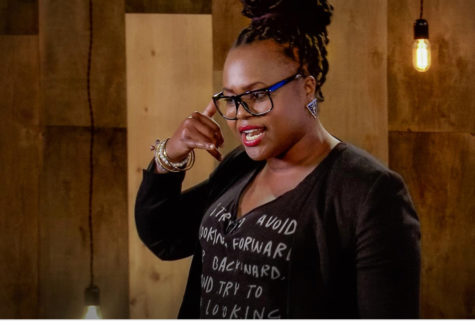
Some students whose talks were not chosen for the April 21 event will still get the chance to present their talks at the TEDx Salon taking place on Tuesday, April 24 at 6:00 p.m. in the middle school quad. There will be desserts, faculty, family,and friends on hand to hear the students give their talks.
“I am excited to present my talk and share my idea worth spreading to the audience and the world on April 21st at the Benjamin Hall,” said seventh grader Charlie Spungin. “I think it is a cool idea that the size of something or someone doesn’t matter, and if you think that you can do something, you can do it, and I want my idea to be heard,” he said.
Not only are the talks an outlet for students’ voices and good resume builders, but the students also gain valuable skills from their experience.
“Although the process is long and difficult, through hard work it eventually pays off,” said seventh grader William Harris. “Memorizing and writing TEDx talks are hard, but when I put my mind to it, I did it. The most frustrating aspect of the TEDx talks are all of the time that you have to put into them. The most rewarding thing after the journey is eventually looking back and seeing how much my writing and public speaking skills improved,” he said.
“I want them to gain presentation literacy,” said James, referring to the ability of an individual to access, analyze, and produce information for a specific outcome. “The creator of TEDx, Chris Anderson, wrote a book about TED talks and the thing you need the most [in life] is presentation literacy,” she said.
For James, she has been able to see first-hand how the students have challenged themselves and become better writers, speakers, and listeners. Their talks from the stage will simply be the icing on the cake. “The most rewarding thing at the end is looking back and seeing how much the students grew,” she said.
